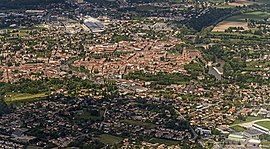Lavaur, Tarn
Lavaur | |
|---|---|
 An aerial view of Lavaur | |
 Coat of arms | |
show Location of Lavaur | |
 Lavaur | |
| Coordinates: 43°41′59″N 1°49′11″E / 43.6997°N 1.8197��ECoordinates: 43°41′59″N 1°49′11″E / 43.6997°N 1.8197°E | |
| Country | France |
| Region | Occitanie |
| Department | Tarn |
| Arrondissement | Castres |
| Canton | Lavaur Cocagne |
| Intercommunality | CC Tarn-Agout |
| Government | |
| • Mayor (2020–2026) | Bernard Carayon[1] |
| Area 1 | 62.83 km2 (24.26 sq mi) |
| Population (Jan. 2018)[2] | 10,671 |
| • Density | 170/km2 (440/sq mi) |
| Time zone | UTC+01:00 (CET) |
| • Summer (DST) | UTC+02:00 (CEST) |
| INSEE/Postal code | 81140 /81500 |
| Elevation | 105–274 m (344–899 ft) (avg. 141 m or 463 ft) |
| 1 French Land Register data, which excludes lakes, ponds, glaciers > 1 km2 (0.386 sq mi or 247 acres) and river estuaries. | |
Lavaur (French pronunciation: [lavɔʁ]; Occitan: La Vaur) is a commune in the Tarn department in southern France. It lies 37 km southeast of Montauban by rail.
History[]
Lavaur was taken in 1211 by Simon de Montfort during the wars of the Albigenses, a monument marking the site where (Lady of Lavaur) was killed,[3] being thrown down a well and stoned to death.[4] The town was also taken several times during the religious wars of the 16th century.
Geography[]
Lavaur stands on the left bank of the Agout, which is here crossed by a railway-bridge and a fine stone bridge of the late 18th century.
Demographics[]
Population:
- 1906: town 4069; commune 6388
- 1999: commune 8537
- 2006: commune 10,369
Sights[]

From 1317 till the French Revolution Lavaur was the seat of a bishopric; Lavaur Cathedral, dedicated to Saint Alan, was built for this purpose, dating from the 13th, 14th and 15th centuries, with an octagonal bell-tower. A second, smaller square tower contains a jaquemart (a statue which strikes the hours with a hammer) of the 16th century. In the bishops garden is the statue of Emmanuel, comte de Las Cases, one of the companions of Napoleon at Saint Helena.
Economy[]
The town carries on distilling and flour-milling and the manufacture of brushes, plaster and wooden shoes.
Notable residents[]
- Pierre Fabre, founder of Laboratoires Pierre Fabre[5]
- Étienne de Voisins-Lavernière (1813–1898), French deputy and then senator for Tarn
Miscellaneous[]
There is a subprefecture and a tribunal of first instance (a lower Court of Justice).
See also[]
- Communes of the Tarn department
References[]
- ^ "Répertoire national des élus: les maires". data.gouv.fr, Plateforme ouverte des données publiques françaises (in French). 2 December 2020. Retrieved 7 December 2020.
- ^ "Populations légales 2018". INSEE. 28 December 2020.
- ^ "Archived copy". Archived from the original on 2010-03-01. Retrieved 2010-04-30.CS1 maint: archived copy as title (link)
- ^ "Languedoc (Traditional province, France)". www.crwflags.com. Retrieved 13 April 2018.
- ^ "Pierre Fabre, founder of pharmaceutical giant, dies". Agence France Presse. France 24. 2013-07-20. Archived from the original on 2013-07-23. Retrieved 2013-08-17.
| Wikimedia Commons has media related to Lavaur, Tarn. |
- Communes of Tarn (department)
- Languedoc
- Tarn (department) geography stubs


